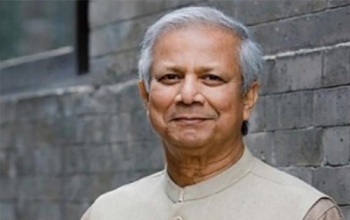Nobel Laureate Muhammad Yunus Discusses Bangladesh’s Political Crisis and way forward in ABP News Interview
Paris, France – Nobel Peace Prize winner and founder of Grameen Bank, Professor Muhammad Yunus, recently gave an in-depth interview to ABP News, addressing the unfolding political crisis in Bangladesh. The conversation touched upon the current state of affairs, the historical context, and the implications for Bangladesh’s relationship with its neighbors, particularly India.
A New Liberation Day
Professor Yunus compared the current situation to a second Liberation Day, recalling Bangladesh’s independence from Pakistani rule in 1971. He described the current protests as a nationwide celebration, primarily led by students demanding changes in government policies. Yunus highlighted the significant public dissent against Prime Minister Sheikh Hasina, who has reportedly fled the country amidst the turmoil.
Youth-Led Protests and Government Response
The Nobel laureate detailed how the protests began with students demanding changes in government job quotas. The government’s harsh response, involving police, border guards, and ultimately the army, escalated the situation, leading to numerous deaths and a growing movement calling for Hasina’s resignation.
Democratic Deficit and Corruption
Yunus criticized the Hasina administration for its lack of democratic processes, citing rigged elections and suppression of political rights. He emphasized that many young Bangladeshis have never participated in a genuine election, fueling their frustration and leading to widespread protests.
Role of Jamaat and Opposition
Addressing concerns about the opposition, Yunus discussed the role of Jamaat-e-Islami and the Bangladesh Nationalist Party (BNP). He asserted that in a true democracy, all parties, including Jamaat, should have the right to participate in elections as long as they adhere to the law. Yunus highlighted that the government’s practice of barring these parties from the electoral process only fueled further unrest and discontent.
India’s Role and Reaction
Addressing India’s role, Yunus expressed disappointment in India’s support for Hasina’s government and its lack of action during the current crisis. He urged India to support democratic processes in Bangladesh, warning that continued unrest could have regional repercussions, including an influx of refugees and border tensions.
Path Forward
Yunus advocated for a return to democratic processes and the establishment of a caretaker government to oversee fair elections. He emphasized the importance of democracy in resolving political problems and called for international support to ensure a transparent electoral process.
Global and Regional Implications
In light of Bangladesh’s strategic location in the Bay of Bengal, Yunus underscored the global interest in the country’s stability. He warned that the ongoing crisis, if unresolved, could lead Bangladesh down a path similar to other troubled neighbors like Sri Lanka and Afghanistan.
Professor Yunus concluded with a call for peace and cooperation, urging Bangladesh and India to strengthen their relationship based on mutual respect and democratic values. He emphasized that the future of Bangladesh lies in a peaceful, democratic process that allows its citizens to freely express their political will.










